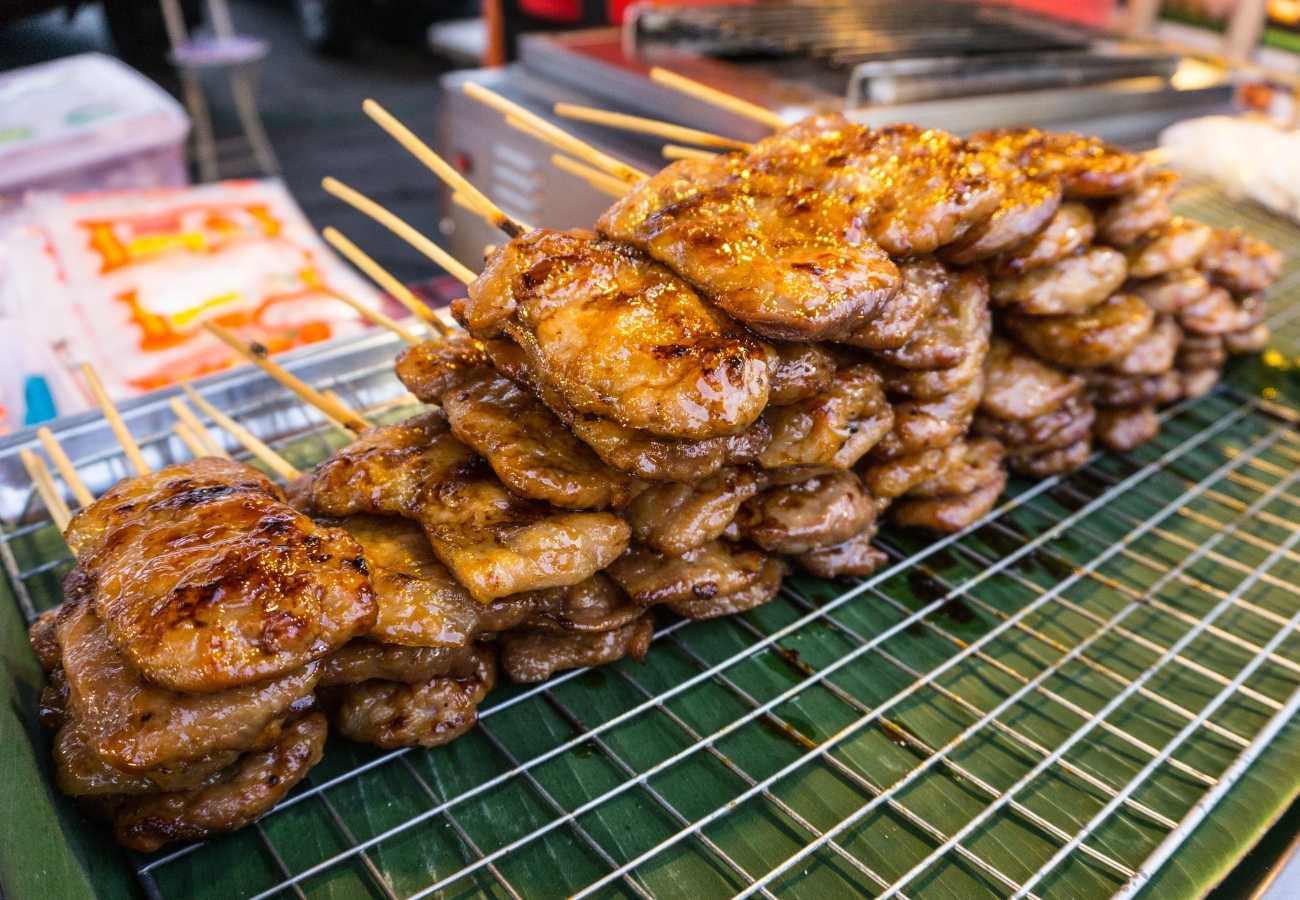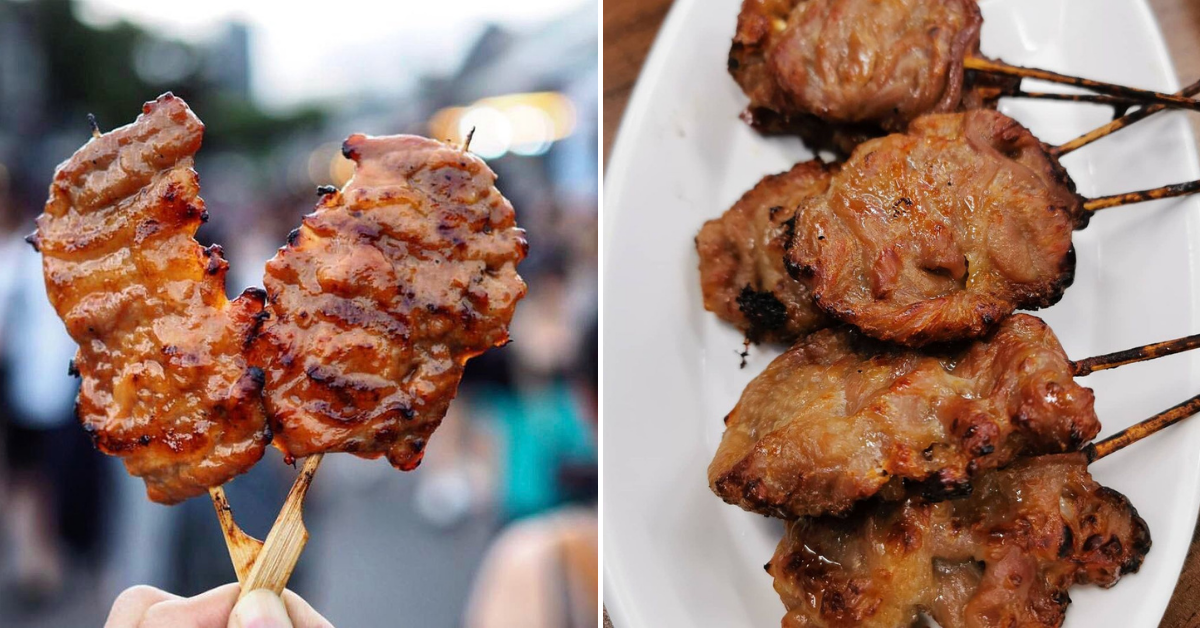Prepare to tantalize your taste buds with our authentic Moo Ping recipe, a beloved Thai street food that will transport you to the vibrant markets of Bangkok. This savory grilled pork dish, marinated in a symphony of flavors, is a culinary masterpiece that embodies the essence of Thai cuisine.
Join us on a culinary journey as we unveil the secrets behind creating this irresistible delicacy.
Moo Ping, meaning “grilled pork,” is a staple of Thai street food culture, enjoyed by locals and tourists alike. Its succulent pork skewers, infused with a harmonious blend of sweet, salty, and tangy flavors, have captivated hearts and stomachs worldwide.
Our recipe will guide you through the traditional preparation methods, from marinating the pork to grilling it to perfection, ensuring an authentic and unforgettable culinary experience.
Ingredients and Preparation

Authentic Moo Ping requires a blend of fresh and flavorful ingredients to achieve its distinct taste and texture.
The primary ingredients include:
- Pork shoulder, thinly sliced
- Soy sauce
- Oyster sauce
- Fish sauce
- Palm sugar
- Garlic
- White pepper
Marinating
The sliced pork is marinated in a mixture of soy sauce, oyster sauce, fish sauce, palm sugar, garlic, and white pepper for several hours or overnight. This allows the flavors to penetrate the meat, resulting in a savory and tender texture.
Grilling
Once marinated, the pork slices are skewered and grilled over hot coals. The grilling process requires constant attention to prevent burning and ensure even cooking. As the meat cooks, the marinade caramelizes on the surface, creating a slightly crispy exterior and a juicy interior.
Marinade
The marinade is a crucial element in Moo Ping, infusing the meat with a symphony of flavors. It is a harmonious blend of tangy, savory, and slightly sweet ingredients, each contributing its unique character to the final dish.
The key ingredients in the authentic Moo Ping marinade include:
- Soy sauce: This provides the marinade with its savory umami base.
- Oyster sauce: Rich and slightly sweet, it adds depth and body to the marinade.
- Fish sauce: A pungent and salty ingredient, it enhances the marinade’s complexity.
- Palm sugar: This natural sweetener balances the marinade’s savory flavors with a hint of sweetness.
- Garlic: Freshly minced garlic adds aromatic depth and pungency.
- White pepper: Its subtle spiciness complements the marinade’s other flavors without overpowering them.
The marinade not only imparts flavor to the meat but also tenderizes it, allowing the flavors to penetrate deeply. The soy sauce and fish sauce contribute to the tenderizing process by breaking down the meat’s proteins.
Grilling
Grilling is the final step in creating mouthwatering Moo Ping. Whether you prefer the smoky flavor of charcoal or the convenience of a stovetop, we’ll guide you through the optimal grilling methods to achieve the perfect sear and doneness.
Charcoal Grilling
For a classic Moo Ping experience, charcoal grilling is the preferred choice. The intense heat and smoky aroma impart a unique flavor to the skewers. Ensure your charcoal is fully ignited and glowing evenly before placing the skewers on the grill.
Grill the skewers over medium-high heat, turning them frequently to prevent burning. Aim for an internal temperature of 160-165°F (71-74°C) for medium-rare or 170-175°F (77-79°C) for medium.
Stovetop Grilling
If you don’t have access to a charcoal grill, stovetop grilling is a viable alternative. Heat a grill pan or cast-iron skillet over medium-high heat. Add a thin layer of oil to prevent sticking.
Grill the skewers on the preheated pan, turning them occasionally until they reach the desired doneness. Keep an eye on the heat to avoid overcooking or burning.
Presentation and Serving
Moo Ping is traditionally presented on skewers, showcasing the succulent grilled pork pieces. These skewers are often arranged vertically in a small container or plate, allowing for easy serving and dipping.
Accompanying the skewers are various dipping sauces, each offering a unique flavor profile. Common choices include the classic sweet and tangy Nam Jim Moo Ping (pork dipping sauce), the spicy and aromatic Nam Jim Jaew (chili dipping sauce), or the refreshing Nam Jim Lon (cucumber dipping sauce).
Garnishes
To enhance the presentation and flavor, Moo Ping is often garnished with fresh cilantro, thinly sliced shallots, and toasted ground rice. These garnishes add a vibrant green color, a subtle oniony flavor, and a satisfying crunchy texture to the dish.
Variations and Regional Differences
Moo Ping, while generally consistent in its core ingredients and preparation techniques, exhibits regional variations that reflect local preferences and culinary traditions.
Northern Thailand
Northern Thai Moo Ping often incorporates sticky rice in the marinade, resulting in a slightly sweeter and more aromatic flavor. Additionally, the meat is typically grilled over charcoal, imparting a smoky undertone.
Central Thailand
In Central Thailand, Moo Ping is known for its balance of sweet and savory flavors. The marinade typically includes a blend of soy sauce, palm sugar, and garlic. The meat is usually grilled over a gas grill, resulting in a more evenly cooked texture.
Southern Thailand
Southern Thai Moo Ping is distinguished by its use of turmeric and coconut milk in the marinade. This combination imparts a slightly yellow hue and a hint of tropical sweetness. The meat is typically grilled over a charcoal grill, adding a smoky and slightly charred flavor.
Nutritional Information

Moo Ping is a relatively healthy street food option, providing a good source of protein, vitamins, and minerals.
A typical serving of Moo Ping (2 skewers) contains approximately:
- Calories: 200-250
- Protein: 20-25 grams
- Fat: 10-15 grams
- Carbohydrates: 10-15 grams
Micronutrients
Moo Ping is also a good source of several micronutrients, including:
- Iron: Essential for red blood cell production
- Zinc: Important for immune function and wound healing
- Vitamin B12: Vital for nerve function and blood cell formation
Health Benefits
Consuming Moo Ping in moderation can offer several health benefits:
- Provides essential nutrients: Moo Ping is a good source of protein, vitamins, and minerals, which are essential for overall health and well-being.
- Supports muscle growth and repair: The high protein content in Moo Ping helps support muscle growth and repair, making it a good choice for athletes or individuals looking to build muscle.
- Boosts immunity: The zinc content in Moo Ping helps boost the immune system, protecting against infections and illnesses.
- Improves blood health: The iron content in Moo Ping helps improve blood health by supporting red blood cell production, which is essential for oxygen transport throughout the body.
Last Point
As you savor each bite of your homemade Moo Ping, let the authentic flavors transport you to the bustling streets of Thailand. Whether you enjoy it as a standalone snack or pair it with sticky rice or a refreshing dipping sauce, this dish is guaranteed to leave a lasting impression.
Experiment with regional variations and add your own culinary flair to create a Moo Ping that reflects your unique taste preferences. Embrace the joy of cooking and indulge in the culinary delights of Thailand with our authentic Moo Ping recipe.
Frequently Asked Questions
What is the secret to a flavorful Moo Ping marinade?
The key to a tantalizing Moo Ping marinade lies in the perfect balance of sweet, salty, and tangy flavors. Our recipe incorporates a harmonious blend of soy sauce, oyster sauce, fish sauce, palm sugar, garlic, and coriander, each ingredient contributing its unique essence to create an irresistible marinade.
How do I achieve the perfect sear on my Moo Ping?
To achieve that mouthwatering sear on your Moo Ping, it’s crucial to use a hot grill and cook the pork skewers over high heat. This searing technique locks in the juices, resulting in tender and flavorful meat with a beautiful golden-brown exterior.
What is the best dipping sauce for Moo Ping?
Moo Ping is traditionally served with a sweet and spicy dipping sauce known as “nam jim.” This sauce is typically made with a combination of chili peppers, garlic, shallots, lime juice, and fish sauce, creating a perfect complement to the savory grilled pork.
